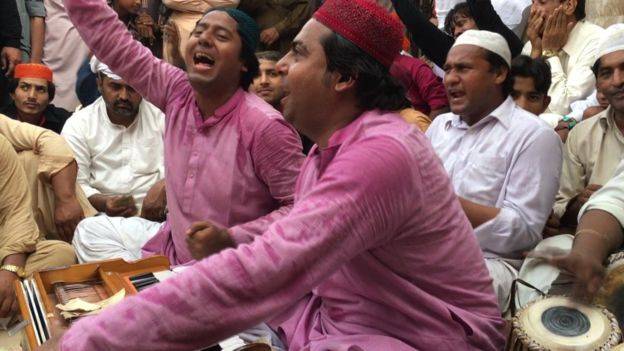Qawwali maestro Nusrat Fateh Ali Khan's family has been bound to the shrine of Baba Farid Ganj Shakar for the past 800 years.
The family legend is that the Sufi saint blessed them with their heritage where generation after generation will perform the mystical music.
Every emerging Qawwal is duty bound to perform first at the shrine before launching a world career.
And two young boys are getting ready to follow in the family footsteps.
Brothers Kaif, 12, and Saif Ali Miandad Khan, 13, started to learn Qawwali music as soon as they could talk.
Their years of intensive training has been building up to one point - performing at the shrine for the first time.
Their mother Shumaila nervously taps her fingers in tune with the tempo as the brothers practice vocals alongside their father.
"We left everything behind, our lives in Karachi so my sons could do their sacred duty and perform here," she says.
"There are so many big names attending, this is the first stage that can make or break their careers."
Ancient rite
The spiritual songs are often in the form of a dialogue with God, kept in time to the beat of Eastern musical instruments such as the "Tabla" drums and harmonium.
It is based on the Sufi Islamic narrative of transcendence through music to make the ultimate link with the divine.
Before Qawwali became a secular and commercial genre through big names like Nusrat Fateh Ali Khan and the Sabri Brothers, it began as a spiritual music performance at Sufi shrines around Punjab.
Every year, thousands throng the 12th Century Sufi saint Baba Farid Ganj Shakar's tomb to mark the anniversary of his death.
He is celebrated as one of the first poets of the Punjabi language whose words form the original lyrics to the songs.
Most of the famous Qawwal "Gharaanas" or households hail from Pakpattan, in Pakistan's South Punjab province where Baba Farid's tomb is located.
Nusrat Fateh Ali Khan's nephew, Ustad Mahboob Farid Akram Khan, is performing at the shrine to pay tribute.
His fingers slide over the harmonium at his feet, as he sings, the rhythm kept in time with the thunderous beat of the Tabla.
He is sweating but appears unaware, as his voice rises and swoops with the music.
He is offering up his songs in both gratitude and prayer.
"The shrine is both sacred and a school for Qawwals," says Ustad Mahboob.
"We grow up performing here, and even now, we must first gain the approval of our patron saint before composing new music or launching new projects. Baba Farid is the link that binds us all."
As he reaches his peak, the performer and the audience appear joined together by the music, in a hypnotic state.
Every few minutes, a member of the audience gets up and starts swaying and whirling to the beat, eyes closed, arms out-stretched.
Their devotion re-affirms the popularity of the mystical side of Islam in a country where militancy and radical Islamic narratives often seem dominant.
Family fortunes
But brothers Saif and Kaif have more pressing concerns as they take to the stage for the first time.
There are ancient rituals to be performed before they embark on foot towards the shrine.
Sacred prayers are said by the women of the family as Saif and Kaif are escorted from the house.
Their mother holds the Holy Quran over them and they bow their heads to pass under it.
They walk down a corridor where both walls are lined with portraits of their Qawwal ancestors and seek the blessing of their oldest Uncle, the famous Qawwal Sher Miandad Khan.
"We have grown up listening to the spiritual songs of my grandfather and uncles, it has always moved my heart," says Kaif Miandad.
"I know when I pray and perform at Baba Farid's he will make me a big star."
Legendary legacy
Finally they reach the performing grounds.
On the podium, a voice formally announces their arrival.
The boys straighten up and stand tall to start their performance, carrying their clan's legendary legacy on their small shoulders,
As their voices rise and their hands re-inforce the energy of their voices, they are showered with money and praise.
Other Qawwals throw a shawl over their shoulders as a mark of respect.
Listeners close their eyes and sway.
As it has done for hundreds of years, the shrine of their patron saint marks this moment for Kaif and Saif.
Courtesy BBC






